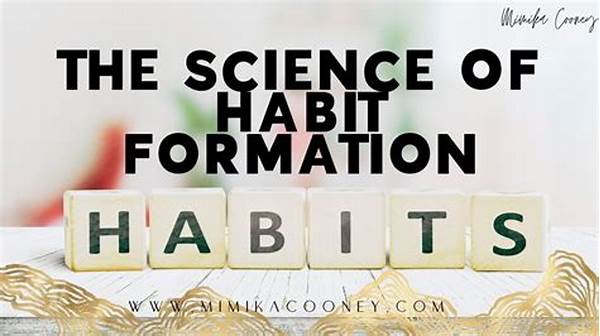In today’s ever-evolving world, millennials find themselves swamped by a range of demands, balancing work, personal life, and aspirations while attempting to maintain a sense of purpose and fulfillment. The secret to achieving this balance lies in mastering the art of habit formation. But why should you, a millennial navigating the complexities of modern life, care about habit formation science every millennial must know? Simply put, understanding and applying these principles can lead to a more productive, healthier, and happier lifestyle. Imagine waking up every day not overwhelmed by a chaotic to-do list but driven by a set of well-established habits that propel you toward your goals effortlessly. This article endeavors to unravel the science behind habit formation and why it’s crucial for every millennial.
Read More : The Role Of Accountability In Habit Building
Habit formation is not a concept confined to psychological textbooks; it’s a proven framework that has changed countless lives. At its heart, habit formation revolves around the cue-routine-reward loop, a concept popularized by Charles Duhigg in his bestseller “The Power of Habit”. It starts with identifying the cues that trigger specific behaviors, followed by the routines these cues initiate, and the rewards that reinforce the loop. Once you grasp this cycle, you can gain control over your behaviors, replace bad habits with good ones, and ultimately achieve results that align with your life goals. This is the essence of habit formation science every millennial must know.
As you delve deeper into this concept, it’s essential to acknowledge that habit formation isn’t about rigid discipline or robotic routines. It’s about strategically designing your environment, routines, and mindset to naturally funnel you toward your desired outcomes. From tech entrepreneurs to wellness coaches, countless stories highlight how mastering habit formation can lead to remarkable personal and professional transformations. Millennials, often seen as a generation characterized by their desire for efficiency and innovation, are uniquely positioned to leverage these principles for success. So, what is habit formation science every millennial must know, and how can it give you the edge you need in this competitive world?
The Power of Habit Formation for Millennials
Breaking down the walls of old habits to form new ones isn’t just a struggle; it’s an art. It involves planning, persistence, and often a pinch of humor. The science of habit formation weaves through the very fabric of our daily routines, whispering promises of efficiency and success to those who can harness its power. So many millennials are finding themselves knee-deep in strategies that really work, wondering how they could have lived so long without knowing the monumental impact of habit formation science every millennial must know. As you embark on this journey, remember the golden rule: start small, celebrate big.
Implementing Habit Formation Science in Daily Life
Millennials thrive on instant gratification, yet the real magic lies in consistent, incremental progress. Begin by choosing a single habit you wish to implement. Identify a cue that seamlessly fits into your routine—perhaps it’s as simple as laying out gym clothes before bed to solidify a morning workout routine. Then, create a supportive environment, surround yourself with allies or mentors who believe in your journey, and reward yourself as you achieve small milestones. Remember, the most profound transformations occur not through drastic changes but through these subtle shifts in your daily practices.
1. Foundation of Habits
In understanding the foundation of habits, one must first explore the intricate construction that makes habits tick. At its core, habits are built upon repeated actions that become automatic over time. The foundation of habit formation science every millennial must know lies in the understanding of triggers or cues that lead to these behaviors.
2. The Habit Loop
You might think of the habit loop as the secret sauce of habit formation. It consists of a cue, a routine, and a reward. By hacking this cycle, millennials can build and break habits with surprising ease. Research indicates that by consistently engaging in this loop, habits begin to form subconsciously.
3. Common Challenges in Habit Formation
Though empowering, habit formation requires navigating a field full of potential pitfalls. Millennials often face challenges such as lack of consistency and motivation. However, the habit formation science every millennial must know involves preparing for these roadblocks. One effective strategy is using accountability partners to keep goals in sight.
4. Mastering Habit Formation Techniques
Diving into practical techniques, consider implementing visual reminders and digital apps that help in tracking progress and providing constant motivation. Engaging in ‘habit stacking’, a method of linking new habits to existing routines, is another powerful tool every millennial should master.
10 Key Details about Habit Formation Science Every Millennial Must Know
Description:
Habit formation is a journey every millennial should embark upon with open eyes and a brave heart. Modern research has illuminated the path with strategies and tools designed to break through procrastination and bring you to the future you envision. At the heart of this path is the habit loop—a sequence of cue, routine, and reward that propels behaviors from conscious action to second nature. This science is vital in the fast-paced millennial lifestyle, where efficiency rules supreme. Although setbacks are inevitable, embracing the learning curve elevates personal growth and resilience.
Understanding habit formation science isn’t simply about following a regimen. It’s about personal empowerment and owning the driver’s seat of your life. Through the integration of technology and community support, millennials can now reach their goals faster and more effectively. Whether you’re striving to adopt a healthier lifestyle, advance your career, or balance your work-life demands, habit formation science every millennial must know offers you the roadmap and robust strategies to embark on your transformation journey.
The Science Behind Cultivating Lasting Habits
Why Millennials Need Habit Formation Science
Millennials are often characterized by their craving for new experiences and desire to carve out their own life paths. This is why habit formation science every millennial must know offers such appeal. It provides a roadmap to navigate the plethora of choices and distractions, aligning actions with the overarching millennial quest for meaning and impact.
The psychological principles underpinning habit formation provide fascinating insights into behavior change. It’s not just about shifting habits—it’s about transforming identity. By identifying and implementing these practices, millennials can not only achieve their personal goals more swiftly but can influence broader cultural and societal changes through collective action. Taking advantage of peer networks and digital platforms can exponentially magnify these effects.
Key Elements of Habit Formation
Building Effective Habit Strategies
At the crux of effective habit strategies lies the harmonious blend of motivation, ability, and a trigger. Millennials are poised on the cutting edge of technological advancements and community-building platforms, offering perfect conditions to cultivate new habits. Understanding the synergy between these elements is crucial for practical application.
Chronicled success stories among millennials display the results of leveraging habit formation science every millennial must know—resilient adaptation to rapid societal shifts, improved mental health, and immense professional growth. Leveraging these strategies can illuminate paths to personal fulfillment while fostering a generation poised for unique global contribution.
Implementing Habit Techniques for Millennials
A versatile approach to integrating new habits into the millennial lifestyle involves incorporating thematic cues linked to daily life. Consider that you attach an audio cue, such as a favorite podcast, to a particular task—soon, mental associations form, and the habit solidifies. This method has propelled countless daily exercisers and professional innovation leaders to transform their routines.
In conclusion, habit formation science every millennial must know is not just an individualistic venture—it’s an invitation to a community-wide movement advocating progress, joy, and enduring achievement. The impact of these formed habits extends from self-betterment to inspiring peers, carving paths to more collective accomplishments. By embracing the science and combining it with personal aspirations, every millennial holds the potential to revolutionize their life story.
10 Illustrations about Habit Formation Science Every Millennial Must Know
Descriptive Overview:
In diving deeper into the lane of habit formation, millennials can benefit greatly from visual guides demonstrating critical aspects of this journey. Diagrams like the habit loop and flowcharts for implementing new routines offer a straightforward blueprint for understanding the theoretical underpinnings behind behavior change. Such visual aids are indispensable for those who thrive on clear, tangible data representation.
Infographics and illustrative storyboards serve as powerful narrative tools to motivate and engage. Charting progress and creating visual timelines of habit formation milestones resonate well with millennials, allowing for a better grasp of long-haul achievements. The coupling of visual stimuli with habit guides fosters a supportive and informative learning space where millennials—and even the general audience—can glean insights at a glance without feeling overwhelmed or overburdened by theoretical constructs.
Ultimately, these creative visual approaches in conveying habit formation science every millennial must know transform what could be an academic pursuit into an accessible, engaging, and pragmatic lifestyle upgrade that brands, communities, and individuals can collectively endorse and celebrate.



